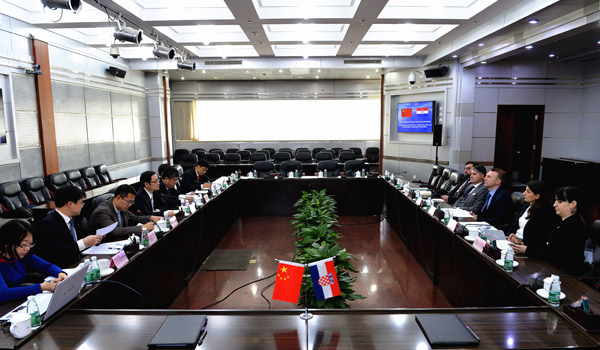
On December 12, 2017, the Eighth Regular Session of the China-Croatia Intergovernmental Committee on Science and Technology Cooperation was held in Beijing. Vice-Minister of Science and Technology Li Meng and State Secretary of the Croatian Ministry of Science and Education Matko Glunčić co-chaired the meeting. Nebojsa Koharovic, Croatian Ambassador to China, attended the meeting.
Vice-Minister Li Meng introduced the development of science, technology and innovation in China and related arrangements in light of the spirit of the 19th CPC National Congress. He stressed that to understand China‘s future, one must start with understanding the 19th Party Congress. The report of the 19th Party Congress puts innovation on top of the five major development concepts, and emphasizes that innovation is the primary driving force of China’s development and the strategic underpinning of China’s modern economic system. This is a summary of the experience of General Secretary Xi Jinping in governing the country in the past five years. It is an important component of the Xi Jinping Thought on Socialism with Chinese Characteristics for a New Era and a guide for China’s science and technology innovation in the future.
Vice-Minister Li pointed out that over the past five years, China has built up a complete innovation system from concepts to strategies and actions, and made historic and significant achievements. A number of world-leading scientific and technological achievements such as supercomputing and quantum communication have come out in succession. China ranks among the highest in the world in the technologies of mobile communications, high-speed railway and equipment manufacturing, and leads the global trend of digital economy and sharing economy. China’s scientific and technological strength and international influence have significantly improved. At present, China‘s economy has shifted from a phase of rapid growth to a stage of high-quality development. We must rely on innovation to upgrade the quality, efficiency and driving force of economic development. China will firmly pursue the strategy of innovation-driven development and build an innovative country. China’s goal is to become an innovative country by 2020 and a leading innovative nation by 2035. To this end, China will strengthen basic and applied basic research to stand at the world‘s scientific and technological frontiers. China will deploy and implement a number of major scientific and technological projects in such fields as quantum computers, brain science as well as deep space, deep sea and deep ground exploration. We will pursue parallel progress in scientific and technological innovation and institutional innovation, promote deeper integration of industry, academia and research, facilitate the transfer and conversion of scientific and technological achievements and build a sound ecological environment for innovation and entrepreneurship. We will respond to the immediate needs caused by the changes in the principal contradiction of the Chinese society, and give full play to the critical role of scientific and technological innovation in poverty eradication, population aging, health protection, environmental protection and public safety. We will also be more proactive in integrating into the global innovation network, strengthen openness and cooperation in innovation capacity, and play a more important role in addressing global issues.
Vice-Minister Li Meng said China’s Ministry of Science and Technology is willing to work with the Croatian side to make better use of the role played by the Intergovernmental Committee in planning, coordinating and promoting cooperation. He is confident that with the implementation of the Belt and Road Initiative, China-Croatia cooperation in science, technology and innovation will enjoy a broader prospect.
State Secretary Matko Glunčić gave an overview of the development of science, technology and innovation in Croatia, the implementation of its national innovation strategy and intelligent specialization strategy as well as Croatia‘s participation in Horizon 2020.
During the meeting, the two sides had an in-depth exchange of views on issues such as deepening cooperation in science, technology and innovation. The two sides reviewed the implementation of the projects approved at the 7th regular session of the committee, discussed and adopted the new plan of inter-governmental science and technology exchange projects, covering areas such as ecological protection, physics, nanotechnology, energy and agriculture. The two sides agreed to strengthen people-to-people exchange in the field of science and technology, and explore the possibility of jointly holding a seminar on science and technology cooperation; expand the scale of cooperation in scientific research projects, and strive to launch the first batch of R&D cooperation projects in 2018; continue to support the development of China-Croatia International Joint Research Center on Ecological Preservation, and build more joint laboratories or joint R&D centers and other long-term cooperation platforms; encourage cooperation between industrial clusters from both sides, and work for win-win results based on mutual complementarity; promote scientific and technological cooperation in broader areas, at deeper levels and with more extensive participation, and make new contributions to the development of bilateral relations.

After the meeting, the two sides signed the Protocol of the Eighth Regular Session of the China-Croatia Intergovernmental Committee on Scientific and Technological Cooperation.

